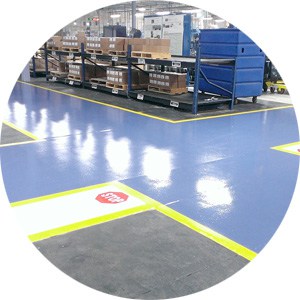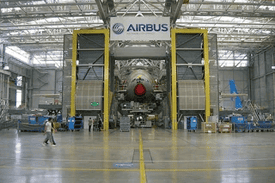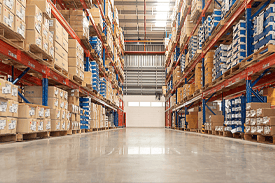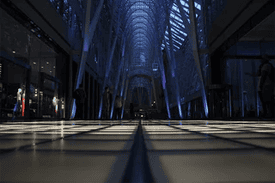
Floor Coatings for General Manufacturing Facilities
Durable, High-Performance Coatings Built for Industrial Demands
If you’re in the general manufacturing sector, you know the value of quality equipment that’s built to last. In the same way, the factory floor coating you choose should be strong enough to withstand day-to-day stresses without needing to be replaced every couple of years.
The Daily Demands on Manufacturing Floors
High Foot Traffic
Heavy Equipment
Safety Concerns
Maintenance Tasks
Uninterrupted Operations
Chemical Exposure
Temperature Extremes
Factory Floor Coating — Turning Challenges into Operational Wins
Given the above demands and challenges, investing in a quality floor coating in manufacturing environments is necessary. But factory managers will be glad to know this step also opens the door to many benefits, like:
- Extended Floor Life – A strong, resilient surface protects the underlying structure, delaying costly replacements and major repairs.
- Enhanced Durability – Withstands heavy loads, impact, and abrasion while maintaining peak performance in demanding conditions.
- Streamlined Workflow – Smooth, damage-free surfaces keep equipment and people moving efficiently, avoiding production delays.
- Workplace Safety – Slip-resistant finishes help prevent accidents, while sealed surfaces eliminate cracks where germs and contaminants can collect.
- Simplified Maintenance – Coated floors clean faster and more thoroughly, requiring less labor, less downtime, and fewer cleaning materials.
- Increased Productivity – By minimizing disruptions from floor damage or repairs, teams can stay focused on production goals.
- Maximized ROI – Lower maintenance costs, reduced downtime, and extended floor life combine to deliver strong returns on the initial investment.

Industrial-Grade Floor Coating Options for General Manufacturing
Epoxy Floor Coating

Epoxy can provide a versatile, hard, low-maintenance, and long-lasting product for your manufacturing facility. Crafted from a curative and polyepoxide resin, epoxy's strength comes from the tight chemical bond between these two ingredients. Epoxy can cover an indoor or outdoor floor and is suitable for most hard surfaces. This durable coating stands up to impacts and heavy traffic and lasts for years.
Urethane Floor Coating

Tough, versatile, and beautiful, urethane is also noted for its exceptional strength and abrasion resistance. Polyurethane provides a clear coating, but urethane floor coatings come in pigmented colors, making urethane one of the most beautiful floor coatings on the market. It rarely chips or cracks, but it can be easily repaired. Urethane works particularly well as a floor coating for manufacturing facilities whose floors sustain heavy traffic.
USDA-Compliant Floor Coating

If your factory processes Food & Beverage products, your floors will need to meet several regulations from government agencies, along with CGMP requirements. You'll want to consider sanitation, safety, durability, and aesthetics when choosing your floor covering. Generally speaking, both epoxy and urethane coatings meet these requirements, as they withstand high temperatures and constant moisture while preventing cracks that could harbor bacteria.
Floor Striping for 5S Organization

Floor striping for 5S organization supports the principles of Sort, Set in order, Shine, Standardize, and Sustain (sometimes companies add another S for Safety). The striping makes workflows instantly clear to anyone on the floor. Unlike colored tape, which frays, loosens, and creates hazards, professionally applied striping maintains a clean, safe appearance while guiding movement, marking hazards, and communicating process flow. In warehouses, it helps keep traffic organized, reinforces safety, and supports overall operational efficiency.
Floor Joint & Crack Filling

Floor joint and crack filling protects concrete floors from the damage and risks caused by natural settling, which can create openings for moisture, oils, chemicals, and debris. Left unaddressed, these cracks and joints not only look unsightly but can create safety hazards and contribute to machinery wear. By sealing or filling them (often with specialized materials for chemical or corrosive environments), you preserve the floor’s integrity, safety, and longevity.
Anti-Slip Flooring

Anti-slip flooring is a proactive way to reduce workplace accidents, protecting both people and your bottom line. By incorporating crushed minerals or sand into an epoxy coating, the surface gains extra grip to help prevent slips and falls. Combined with additional safety measures, this durable solution resists cracking and fading while supporting a safer, more compliant work environment.
Electrostatic Dissipative Flooring

Electrostatic dissipative (ESD) flooring safely channels static electricity through controlled electrical resistance, reducing the risk of electrical events that may cause damage. This makes ESD flooring both a functional safeguard and a visually appealing choice for static-sensitive environments.
Extreme Chemical-Resistant Floor Coatings

Extreme chemical-resistant floor coatings protect against the staining, erosion, and deterioration caused by corrosive chemical spills. Made with specially formulated epoxy, they shield the underlying surface while still offering attractive design options that don’t sacrifice aesthetics. When properly installed, these coatings provide long-lasting protection, making them essential for facilities handling harsh or abrasive substances.
FAQs
- Epoxy floor coating
- Urethane floor coating
- USDA-compliant floor coating
- Floor striping for 5S organization
- Floor joint & crack filling
- Anti-slip flooring
- Electrostatic dissipative (ESD) flooring
- Extreme chemical-resistant floor coatings
Let’s Talk about Your Manufacturing Flooring Solutions
Need durable, long-lasting flooring that can stand up to the daily demands of your manufacturing facility? Talk to the experts at CPC Floor Coatings.
With over 40 years of experience, we know how to deliver flooring solutions that balance performance, safety, and efficiency, without taking a one-size-fits-all approach. We serve manufacturing facilities across the Southeast within a 300-mile radius of Upstate South Carolina, helping each client choose the factory floor coating that’s exactly right for their operations.
Contact us today to get started. We’ll help you find the right solution for your space, your workflow, and your budget.




